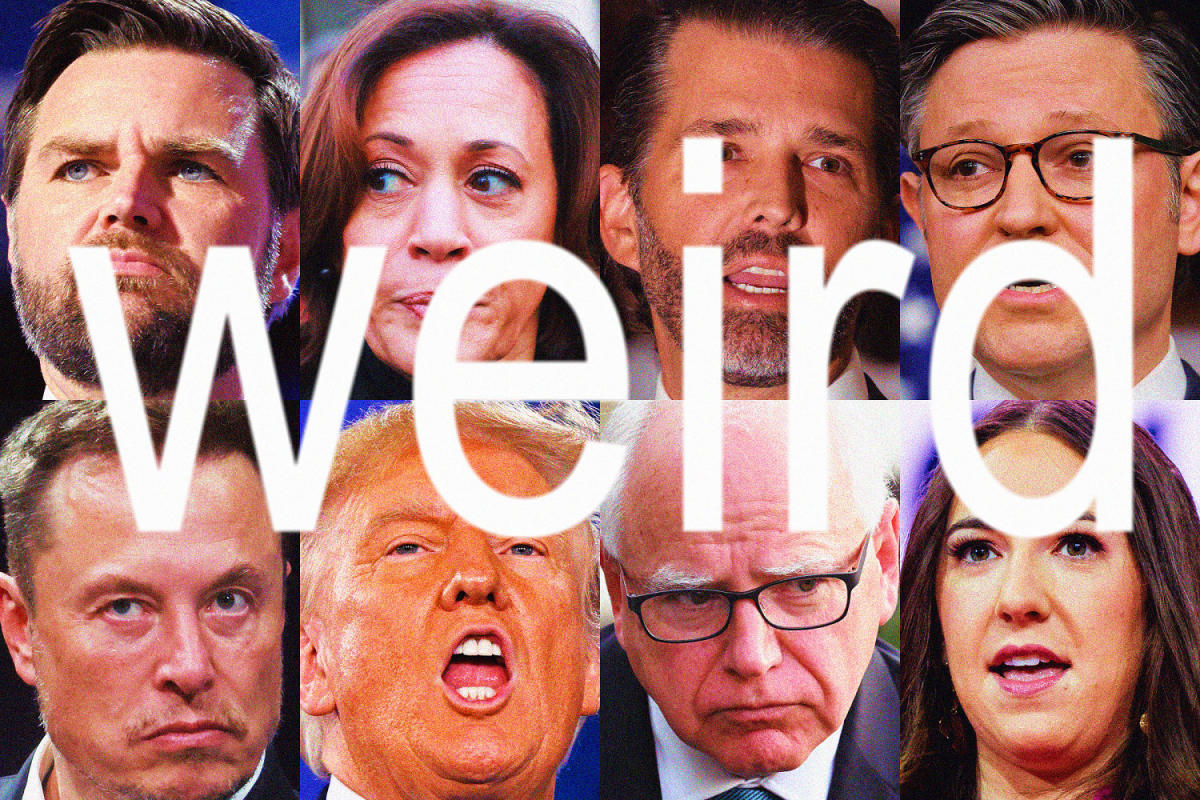This week, the race for president got “weird.”
The relatively benign word suddenly seemed to be everywhere in the political discourse, from campaign videos and podcast appearances to X posts and cable news hits. People on the left hurled it at those on the right, seizing on it as a fresh rallying cry amid a broader burst of energy sparked by the ascension of Vice President Kamala Harris as the presumptive Democratic presidential nominee. People on the right, in turn, sought to reverse the affront by leaning on some of the topics that have most resonated in their social media circles, most notably stigmatizing LGBTQ and gender-nonconforming people.
Harris’ official campaign account on X, “Kamala HQ,” has used the word “weird” to describe Trump and Vance in 14 posts since July 23, while the Democratic “Won’t PAC Down” super PAC released a political ad themed around calling conservatives weird on Monday that has over 12 million views on X and YouTube combined.
By Friday, the word had made its way to the upper echelons of the ongoing political dogfight, with White House senior deputy press secretary Andrew Bates needling a Republican media account on X with “Don’t be weird,” in response to a video of President Joe Biden going to thank the pilot of the plane that brought home U.S. prisoners from Russia.
Even some on the right said the “weird” attack had landed.
“Casting your opposition as cringe, lame, and weird is an effective strategy,” conservative political activist Matt Walsh posted Monday on X. “It’s visceral. It moves people. The Dems are evil but not stupid.”
“I hope Republicans have the nerve to fight like that,” he added. “It’s the only way. Fire with fire. It’s going to get ugly.”
As the use of “weird” gained traction, Republicans responded, pivoting to use the word against Harris and to describe trans and other LGBTQ people, as well as gender-nonconforming individuals. Anti-LGBTQ efforts, particularly those targeting trans people and drag performers, have been a major pillar of conservative legislation, campaigning and online rhetoric that can spill into real-life conflict.
Donald Trump Jr. has leaned heavily on redirecting the word “weird,” using it against Harris five times, including in a caption on a video of her high-fiving a drag performer. Libs of TikTok, one of the most followed far-right accounts on social media, has used “weird” as a pejorative in 14 posts since July 23, most of them alongside images and videos of drag performers and people displaying what some might perceive as gender nonconformity, like Harris’ stepdaughter Ella Emhoff with unshaven armpits and men wearing makeup.
Greg Price, the communications director for the pro-Trump State Freedom Caucus Network, posted side-by-side images of Vance’s family and of Harris with a drag performer. “The left wants you to believe that one of these people is ‘weird’ [and] that the other one is completely normal,” he wrote. The post has over 5 million views.
Some Democrats have sought to seize on those attacks as exactly what they mean when they say “weird.” Sen. Chris Murphy, D-Conn., responding to former Republican presidential candidate Vivek Ramaswamy saying the use of “weird” was “dumb & juvenile,” posted on X: “Your party’s obsession with drag shows is creepy. Your candidate’s idea to strip the vote away from people without kids is weird. The right wing book banning crusade is super odd.”
I wish a knew a better way to describe it. Your party’s obsession with drag shows is creepy. Your candidate’s idea to strip the vote away from people without kids is weird. The right wing book banning crusade is super odd.
It’s just so so far outside the mainstream. https://t.co/rgj9AsMWOd
— Chris Murphy 🟧 (@ChrisMurphyCT) July 30, 2024
When a conservative meme account posted a crude drawing of a trans Harris supporter surrounded by trash and sex toys in her room, it got over 100,000 likes. A post commenting on it got even more engagement, with the caption: “Taking the time to illustrate this just proves that you are all, in fact, very weird.”
The use of “weird” by Democrats appears to have come from a July 23 appearance by Gov. Tim Walz of Minnesota on MSNBC’s “Morning Joe.”
“We do not like what has happened, when you can’t even go to Thanksgiving dinner with your uncle because you end up in some weird fight that is unnecessary,” Walz, who is in contention to be Harris’ vice presidential pick, said. “Well, it’s true. These guys are just weird.”
The quote was sandwiched in between criticisms of former President Donald Trump and his vice presidential nominee JD Vance, who Walz asserted knows “nothing” about “small-town America.” Walz’s criticism hinged on the right’s focus on culture wars, including its negative characterizations of women without children, its book-banning efforts and sowing division.
“The right has really used this mechanism of ‘triggering the libs’ as their guiding philosophy for going on a decade now,” Becca Lewis, a doctoral candidate and researcher at Stanford University studying the far right online and disinformation, told NBC News. “When you call someone weird, it’s a very different move. You’re not acting bothered. And so they don’t get the type of oxygen from that as they get from other responses.”
Trump himself weighed in on the word Thursday in a podcast interview, defending both himself and Vance from the Democrats’ favorite new jab.
“Well, they’re the weird ones,” Trump said. “Nobody has ever called me weird. I’m a lot of things, but weird I’m not.”
This article was originally published on NBCNews.com





